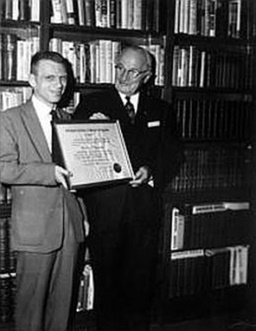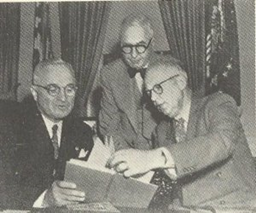The Public Life of Sherlock Holmes: Milton F. Perry’s ‘Harry S. Truman, Sherlockian’

It’s well known in Sherlock Holmes circles that Franklin Delano Roosevelt, 32nd President of the United States of America (now THERE was somebody worthy of that office) was a great fan of the world’s first private consulting detective, even having written about Holmes more than once. The third of his three Vice Presidents, and his successor at the Oval Office, was Harry S. Truman. Truman was also a follower of Holmes and like FDR, was granted membership to The Baker Street Irregulars.
Milton F. Perry himself became an Irregular in 1990. As he mentions in this essay, he was the Curator of the Museum at the Harry S. Truman Library from 1958 until 1976. The position gave him enviable access to the former President. Perry wrote the following essay for the December, 1986 Baker Street Journal. Truman’s interest in Holmes is not as well-known and certainly deserves to be publicized. So, as a frightful election day looms, Come, the game is afoot! – Bob
“Mr. President,” I asked, “What did the dog do in the night time?”
Harry S Truman grinned and looked at his glass of bourbon and branch water. “Perry,” he said, “you ought to know better than test an old Holmesian like me, the only honorary member of the Baker Street Irregulars. You know damned well the dog did nothing in the night time!”
This was my introduction to Harry Truman as a Sherlockian, a relationship I was able to develop from time to time during the years I was associated with him as Curator of the Museum at the Harry S Truman Library in Independence, Missouri, from 1958 until 1976. I was fortunate to have been able to discuss many things with him during those years, mostly in the uninterrupted privacy of his office.
He was a “Holmesian” and a good one too. Truman had a capacity to absorb and remember with great clarity what he had read, and he read constantly. His reading habits were established early because his eyes were never good.
“I had flat eyeballs as a boy, and couldn’t see well enough to play ball with the other kids, so they made me the umpire,” he used to say with a laugh. “I still use the same prescription for my glasses I did then, and it forced me to read a lot, which is my favorite way of relaxing.” He read everything he could find. He said that he had read all the books in the Independence Library as a child, though the collection was a small one.
He once told me of some extra-curricular reading: “I used to get those ten cent novels of western bad men, you know, Jesse James, Cole Younger, and all, and hide them in the barn and sneak out there where I could read them. I’d get a licking from my dad whenever he caught me, but I kept it up. I first read the Holmes stories at that period, along with Tom Sawyer, Huck Finn, and other books of that nature. I’m afraid, at that time, I regarded them as recreation rather than literature, and it wasn’t until many years later that I came to reread them and discovered to my delight that they took an entirely different cast when read as an adult. I still like ‘em and I still reread them.”
That was how the conversation on Holmes began. It was in 1960 at a party at the home of my boss given for the director of a local museum who was moving on to another job. Truman and I had been making the usual party talk when I happened to mention that, though I liked to read new books, I had some favorites that I constantly went back to. His eyes brightened and he told me he did too, mentioning the Mark Twain books and Sherlock Holmes.
In 1945, the Baker Street Irregulars conferred a membership upon him, honoris causa, and enclosed a copy of A Baker Street Folio, a pamphlet containing five letters about Sherlock Holmes that had been written by Franklin D. Roosevelt. (It was FDR’s chauvinistic view that Holmes was an American crook who had tired of his ways and retired to England, “to do something for mankind.”
He also named his cabin at the Presidential retreat, “Shangri-La” (now Camp David), “Baker Street.”(1) Truman was pleased with the honor. “Far from finding you, as you suggest, ‘strange and deluded creatures,’” he wrote Edgar W. Smith, “I commend your good sense in seeking escape from this troubled world into the happier and calmer world of Baker Street.”
(Of course, you’ve read Smith’s “The Implicit Holmes,” since I blogged about it here …)
He then touched off a minor controversy when he wrote, “I had read all of the Holmes novels before I was twelve years old and I would do it again if I had time.”(2)
The analytical minds of the BSI immediately jumped on that one.
Truman was born in 1884 and was twelve years old in 1896. Certainly not all of the cases were published by then. And it was decided, after a bit of convoluted reasoning, that Truman was a good deal younger than everyone thought and was therefore the youngest president the nation had ever had: if he had indeed read them “all,” he’d have been born in 1927!(3)

“I guess I really upset those fellas with my acceptance,” he told me. “They were too embarrassed to tell me I was wrong and had made a mistake so they went all around trying every way they knew to make me right. What I really meant was that I had read all the stories that had come out by the time I was twelve. I read the rest as they came out. By 1930 I had read them all, like everybody else who had followed the stories.”
The BSI regularly invited Truman to the annual dinners, sent him a subscription to The Baker Street Journal, and asked him to write an article for the magazine. He never did, though he did see that they received replies to the invitations. He was, he told them, “looking forward to reading the journal,” and, one year, claimed that if it weren’t for the “heavy pressure these days in preparation for the assembly of the new Congress next week,” he would “send you the message which you suggest.”‘
In early December 1948, after his stunning upset victory over Thomas E. Dewey, Truman was asked by Elmer Davis, an Irregular and a widely known radio newsman, whether he would accept the first award of the Diogenes Club, “an offshoot” of the BSI. The award, the Lantern of Diogenes, would be given “to those who have shed the most light on this and that; and they hope the President will accept the first lantern, for having shed light on the political opinions of the American people at a time when all of us who were in the business of political analysis were groping in the dark….
“I have no idea,” Davis continued, “whether the lantern is something you wear in your button hole, or a real lantern of the kind you take down to the barn when you feed the stock before daylight.”(5)
Davis’ jocular invitation as expressed to Matt Connelly, Truman’s secretary, was preceded by a more formal one from Dr. Charles Goodman who, using a Sherlockian metaphor, said the award was to be granted “to that American who has done the most..To keep the light of freedom and liberty burning, in a world where so many hostile winds are blowing hard to extinguish jt.”(6)
Davis sweetened the political pot by telling Connelly that Edgar Smith, who would present the award, was a General Motors Vice President for overseas relations, “a New Dealer who has long been a solitary rock of sound opinion among the breaking waves of GM ideology.”(7)
The award was presented in the President’s Oval Office, at 11:45 AM., 8 December 1948. Press reports said it was for “throwing light on the state of public opinion” when “alleged experts were stumbling around in the dark.”(8)
Surprisingly, the group had no lantern! Davis rather lamely admitted to reporters that the club planned to present one to the President “later on,” and Goodman wrote Truman that when the lantern was made he would send it to him. No reply is found in the President’s papers. Whether the group didn’t expect their offer to be accepted, or accepted so soon, is unclear.(9)
In 1949, Smith and Davis made another appearance at the White House when they presented Truman with a copy of “The Adventure of The Blue Carbuncle,” the first publication of the Baker Street Irregulars, Inc. It is there today, shelved with the President’s books in the Harry S Truman Library at Independence, Missouri.(10)
1 – ‘Edgar W. Smith to Harry S Truman, Dec. 3, 1945 and Roosevelt to Smith, 18 Dec. 1944. All documents cited are in the President’s Personal File #2275, Harry S Truman Library, Independence, Mo.
2 – Harry S Truman to Edgar W. Smith, 15 Dec. 1945.
3 – Stephan F. Crocker, “A Declaration from Independence, Mo., or ‘The Affair of the Politician,” BSJ (os) 3 (Oct. 1948) 477-78; Page Heldenbrand to HST, 24 June 1946. Heldenbrand, who was stationed aboard the USS Franklin D. Roosevelt, mentioned in a letter a Sherlock Holmes who was then serving in the U. S. Navy. Crocker pointed out that in 1896 only A Study in Scarlet (1887), The Sign of the Four (1890), The Adventures (1892), and The Memoirs (1894) were in print.
4 – Ben Abramson to HST, 21 Dec. 1945; William D. Hassett to Abramson, 7 Feb. 1946; Edgar W. Smith to HST, 9 Sept. 1946; Charles G. Ross to Smith, 18 Sept. 1946; Smith to HST, 19 Dec.
5 – Elmer Davis to Matthew Connelly, 4 Dec. 1948.
6 – Goodman to HST, 3 Dec. 1948.
7 – Davis to Connelly, 4 Dec. 1948.
8 – Washington Star, 9 Dec. 1948.
9 – Goodman to HST, 13 Dec. 1948.
10 – BSJ(NS) 23 (March 1973) 61.1946.
You can read Bob Byrne’s ‘The Public Life of Sherlock Holmes’ column here at Black Gate every Monday morning.
He founded www.SolarPons.com, the only website dedicated to the ‘Sherlock Holmes of Praed Street’ and blogs about Holmes and other mystery matters at Almost Holmes.
He is an ongoing contributor to The MX Book of New Sherlock Stories series of anthologies, with stories in Volumes III, IV and the upcoming V.